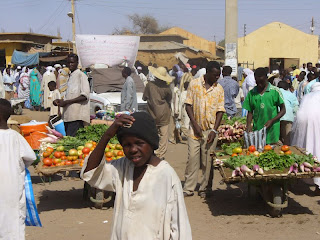Read this quote in the article below and tell me if you would ever use the word "normal" to describe a situation where over 200 people were killed or wounded just 48 hours ago in a major military battle. Another Nubian Knight perspective that war is bad, but living in a war zone is "normal." Someone described this situation as frogs in a pot. It is a strange fact that if you try to throw a frog into boiling water it will jump out immediately. Actually that is not the strange part. But if you throw a frog into a pot of cold water and gradually turn up the heat, the frog will stay and eventually cook to death. It is said that we who choose to work in a war zone are frogs in a pot. When we arrive things are bad but tolerable and as the heat is increased we stay put gradually adjusting to the increase in temperature. Fortunately, few of us of ever been cooked or our case killed or injured would the more appropriate term. But it does take a toll on the psyche and I think that is one area that few of us explore.
What state of mind do we emerge from a war zone?
Ask the men and women who come home from Iraq without a physical scar but lots of conditioning that comes from adjusting to this environment. Some suffer from depression because the mind produces lots of endorphins (a chemical that trigger pleasure in the body in reaction to stress) when you are in the field and then stops suddenly when you return to a less threatening environment. The body becomes hooked and depression sets in as you ride the rough road back to sobriety.
In World War II and in Vietnam, we called it shell shock but it had nothing to do with being in the vicinity of an exploding shell. It was the rough adjustment in returning to a place that had become foreign, after being forced to adapt for extended periods of time to a war environment.
On that note, everything here in Fasher is normal.
There is a very high-level visitor from Khartoum and there are troops everywhere keeping the streets orderly and safe for the second highest member of the national political party after President Bashir. El Fasher has never had a visit from such a high-level politician since the war began. This visit is a some significance I am sure. But I am not qualified to say what that significance may be.
It is hot, hot, hot outside. We have no hot or cold water here, though we have the standard two faucet sinks with the words COLD and HOT written on each. So it is interesting that tap runs so hot that it is actually scalding at midday. That IS room temperature. So, I wonder how my vitamins and medicines are doing. Might be time to refrigerate the lot, if it isn't already too late.
Anyway, as my mind starts to wander, I thought it best to hand this last entry over to the web and give you the article I promised at the start.
Aid Resumes As Conflict Abates
UN Integrated Regional Information Networks
NEWS
19 June 2008
Posted to the web 19 June 2008
Ndjamena
The UN refugee agency, UNHCR resumed its humanitarian operations in all 12 refugee camps along Chad's eastern border with Sudan on 17 June as conflict abated in the east.
"It appears that the situation is returning to normal, and so we are going back to the camps," said Annette Rehrl, spokesperson for UNHCR.
Calm was restored as the Chadian government claimed victory on 17 June following fighting with rebels in Am Zoer, a town 89km northeast of Abeche, which left 161 rebels and three government soldiers dead according to Chadian military spokesperson Mahamat Hassan Abakar, speaking on the radio on 17 June. These figures have not been confirmed by rebel leaders.
Abakar said the army had seized 61 vehicles, as well as weapons and ammunition, during the fighting. According to a journalist in Am Zoer, dead bodies and burned vehicles can still be seen on the town's streets.
"It is the end of the Sudanese adventure," said governor of Ouaddai region, Bichara Issa Djadallah, echoing Chadian government accusations - denied by Sudan - that its eastern neighbour is behind the attacks. According to government sources, rebels are now scattered across the area and some have returned to Sudan.
Rebel columns entered eastern Chad on 13 June, and attempted to take the towns of Goz Beida, Am-Dam, and Biltine. Rebels commanders told journalists that their objective was the capital N'djamena, which rebels also attacked in February.
Major General Touka Ramadan Korei, commander of operations for the Chadian army, announced on the radio, "the intention of the mercenaries was to attack Abeche, but they fell into our trap."
In Abeche people are now going about their daily business. "The market is teeming with people as usual," said one resident.
"Chad is very volatile and it's very difficult to predict what may happen next here," UNHCR's Rehrl said.






















